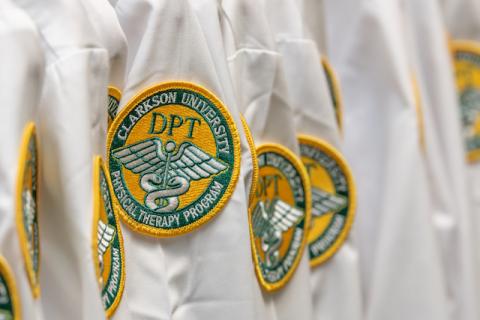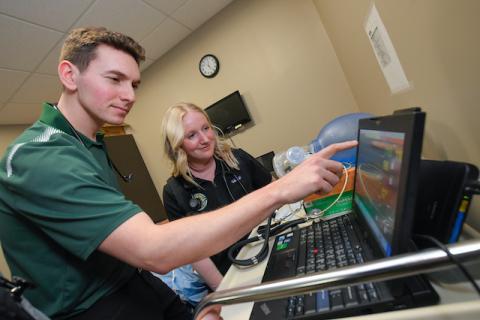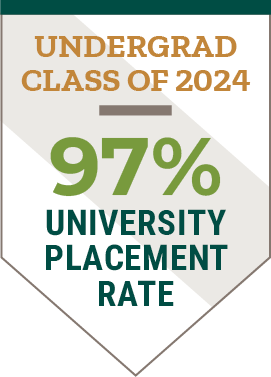A World of Possibilities
Clarkson's Lewis School of Health & Life Sciences is now offering a new Bachelor of Science in Healthcare degree program that can prepare students for virtually countless careers in the healthcare field -- from patient care to public health and policy.
“Healthcare is one of the fastest growing sectors and the world of healthcare is changing rapidly,” according to Lennart Johns, Founding Dean of the Lewis School. “We have designed a curriculum with foundational knowledge, but also the flexibility to adapt to student interests and our changing world.”
The new healthcare major is designed for students who are interested in any facet of healthcare including pre-clinical, business, data analytics, public health policy, research, and bioethics.
Meet Lexi Keller '27
A Healthcare Major minoring in psychology with a concentration in Health Psychology. Lexi is also on our Direct Entry track for the Pre-Physician Assistant M.S. program.
“I learned about Clarkson as I was searching for schools that had a direct-entry Physician Assistant program. Finding a school that had this program would save me a lot of time having to apply later after undergrad. The PA programs are highly impacted and are not guaranteed, which can result in a lot of time between your undergrad and starting your graduate PA program.”
Hear More
Direct Entry to Graduate Programs
Majoring in healthcare is also the newest option for Clarkson’s Direct Entry initiative for healthcare. In this program, students complete four years of undergraduate study at Clarkson for a BS degree, then directly enter our master's or doctorate degree programs in their chosen healthcare field.
There is no second application, as long as all the requirements and academic criteria have been met. Clarkson’s Direct Entry program is designed to attract the best, brightest and most promising students who wish to enter the fields of healthcare. Direct Entry provides a guaranteed spot for first-year undergraduate students in our Doctor of Physical Therapy (DPT) program, MS in Occupational Therapy (MS-OT) program or MS in Physician Assistant Studies (MS-PA) program.
Curriculum
See the course catalog for current Bachelor's requirements and course numbers.
Course Catalog
Students in the Healthcare major will complete 25-26 core credits and 19 elective credits in healthcare, 22 credits in science, 10 credits in math, 4 credits in required seminar, and 39-40 credits which are open or free electives. This design allows a student to be highly focused or diverse in their coursework and the flexibility to design their own curriculum to meet their intellectual interests and career goals.
Embedded within the core Healthcare curriculum are the 15 Core Competencies for Entering Medical Students that have been endorsed by the Association of American Medical Colleges (AAMC).
Core Requirements and Electives
In addition to the Clarkson Common Experience, the following are required:
Science Requirements (22 credits): Students must complete two courses of biology, two courses of general chemistry with lab, one course of general physics with lab
Math Requirement (10 credits): Students must complete two courses in math and one course of statistics.
Healthcare Core Requirement: Students must complete 25-26 credits of courses designated by the Healthcare major.
- Introduction to Psychology
- Bioethics Across the Healthcare Industry
- General Medical Conditions
- Medical Anthropology
- Organizational Behavior
- Evidence-Based Practice
- Developmental Psychology
- Health Psychology
- Professional Experience
Healthcare Electives (19 credits): Students must complete from department approved listing.
- One Healthcare elective: Intro to Health Systems; Health Systems Management; Health Policy Dynamics; Healthcare Marketing; Healthcare Operations; Healthcare Finance
- One Healthcare elective: Medical Ethics; Responsible Conduct of Research; Biomedical Ethics
- One Healthcare elective: Intro to Public Speaking; Introduction to Social Media; Principles of User-Experience Design; Writing for Media; Professional Communication
- One Healthcare elective: Social Media Analysis and Applications; Fundamentals of User Experience; Foundations of Data Visualization; Making and Communicating Innovation
- One Healthcare elective: Sociology of Family; Intro to Gender; Intro to Sexuality; Intro Race & Ethnicity; Men & Masculinity; Diversity Science, Racial Inequality; Health, Wealth, Inequality, and Environment; Women, Gender, Science; Cultural Psychology.
- One Healthcare elective: Biology I: Inheritance, Evolution, and Diversity; Intro to Biomedical; Genetics; Pharmacology of Infectious Disease; Principles of Toxicology and Epidemiology; Immunology; Kinesiology; Biomedical Engineering Fundamentals; Pharmacology
- One Healthcare elective: Social Psychology; Cognitive Psychology; Human Cognitive Evolution; Perception; Learning and Memory; Motivation and Emotion; Cognitive Neuroscience; Abnormal Psychology
Outcomes and Learning Objectives
At the completion of the program student will have attained sufficient knowledge, skills and behaviors to demonstrate to following abilities:
- Think broadly and critically about the healthcare industry
- Identify complex issues in healthcare and ideate workable solutions
- Integrate new information to better understand complex issues
- Work in teams
- Appreciate cognitive diversity
- Effectively communicate healthcare issues
- Apply evidence to support positions and decision




